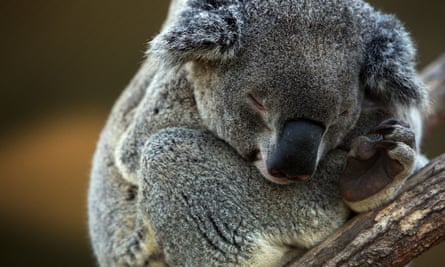Conservationists accuse Sussan Ley of choosing ‘rocks over koalas’ after she approved 52 hectares of habitat destruction to expand Brandy Hill quarry.

Last modified on Tue 27 Oct 2020 19.04 AEDT
More than 50 hectares of koala habitat in the New South Wales town of Port Stephens is set to be cleared after the federal environment minister, Sussan Ley, approved the expansion of a quarry.
The minister, whose decision comes as the government considers the koala for an official endangered listing, said on Tuesday the department’s assessment found the development would “not rob the area of critical koala habitat”.
Local campaigners and conservationists have described the decision as heartbreaking coming after the state’s worst bushfire disaster this past summer. They said environmental conditions that require the developer to plant new trees were “a fig leaf”.
Earlier this year, a NSW parliamentary inquiry found koalas would be extinct in the state by 2050 unless governments took urgent action to address habitat loss.
The expansion of the Brandy Hill rock quarry in Port Stephens in the Hunter region will clear 52 hectares of habitat to more than double the quarry’s annual production from 700,000 tonnes a year to 1.5m tonnes to supply the Sydney construction market.
Residents of Port Stephens have run a months-long campaign that has attracted support from celebrities including Magda Szubanski, Celeste Barber, Olivia Newton-John, Jimmy Barnes and kd lang calling on Ley to reject the development.
“I recognise the proposal has been subject to a high-profile public campaign that has tapped into the genuine concerns we all share about koalas and bushfire-impacted areas,” Ley said.
The minister delayed her decision until this month to hear from campaigners, consider ecological assessments of the site and to allow the department to commission a fresh independent report by an ecologist.
She said on-site assessments concluded that “as few as one or two koalas” were present in the proposed construction area and works could be managed without affecting “small pockets” on the south-western edge of the wider site where koalas had been sighted by residents.
“This is not a region where bushfires have impacted local populations or habitat, the area to be cleared is not a site that is supporting resident breeding populations and, having reviewed the department’s recommendations, I have approved the proposal,” Ley said.
Chantal Parslow Redman, the co-campaign manager of Save Port Stephens Koalas, said the government had chosen “rocks over koalas”. “It’s a heartbreaking decision,” she said.
Parslow Redman said residents involved with the campaign disputed the government’s view that the site did not support breeding populations because they had spotted mothers with young close to the quarry.
“The minister’s statement says this area didn’t burn – that’s the whole point. This is koala habitat,” she said. “This just shows that nothing will stop this government from destroying koala habitat.”
Ley said the approval was subject to strict conditions, including a requirement that the developer, Hanson, establish new koala habitat near the site.
According to the approval conditions, this would involve replanting 74 hectares to the south of the site with trees suitable for koalas. Hanson has been asked to submit a plan for this replanting within the next 12 months.
The conditions also require Hanson to commission site surveys prior to clearing to identify whether koalas are present in any trees due to be bulldozed.
If koalas are sighted, the company has been asked to leave a 25m buffer around the tree to be cleared as well as a corridor to allow “koalas to leave towards habitat outside of the area to be cleared”.
Chris Gambian, the chief executive of the Nature Conservation Council of NSW, said no amount of replanting trees or relocating koalas “is going to make up for the loss of that critical habitat”.
“Given what we know about the state of koalas in NSW – they’re headed for extinction by 2050 – we have to treat every bit of koala habitat as absolutely precious,” he said. “You can’t replicate the forest.”
Both Gambian and Parslow Redman asked what the animals were expected to do after their habitat was cleared, noting that any new trees would require time to grow.
“We’ve only got 200 to 400 koalas left in Port Stephens,” Parslow Redman said. “We just don’t have time to wait for a tree to grow, koalas need habitat now.”
Last month, Ley asked the threatened species scientific committee to consider whether the koala should have its threat status upgraded from vulnerable to endangered due to ongoing habitat destruction and the effects of the bushfires.
The NSW independent planning commission approved the Brandy Hill expansion in July and the project is on a list of developments the NSW government wanted fast-tracked in response to the Covid-19 pandemic.
Hanson on Tuesday welcomed the approval, saying it secured the quarry’s existing 50 direct jobs.
“Over the past six years, the project has been refined to reduce environmental impacts,” the company said in a statement.
“Hanson has dedicated an area of 74 hectares to koala habitat establishment that would be replanted in five stages, investing over $2m across the 10-year program. The establishment of this habitat will ultimately provide koala habitat that is of greater quality than currently exists.”
No comments:
Post a Comment